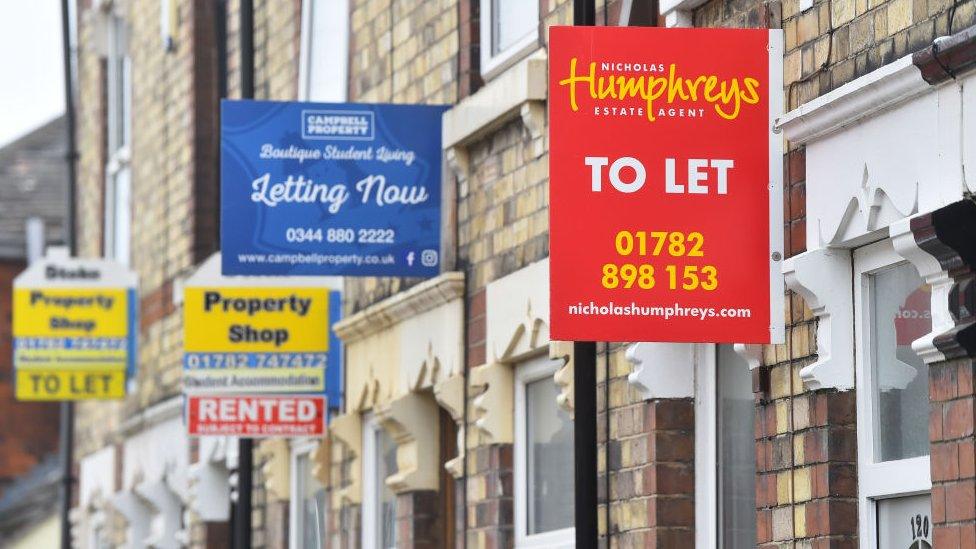Charities 'concerned' over lack of progress with Renters Reform Bill
- Published

A group of 30 charities and non-profit organisations have urged the prime minister to pass a bill to ban "no-fault" evictions.
The Renters Reform Bill would remove the right of landlords in England to evict tenants for no reason with only two months' notice.
Charities warned delays risk causing "more avoidable hardship and suffering" and a "greater cost to the taxpayer".
The government said the bill would resume progress in parliament shortly.
The Conservatives promised "a better deal for renters" - including a ban on no-fault evictions - in its manifesto ahead of the general election four years ago.
In May, the Renters Reform Bill was introduced to Parliament, containing this measure. But it has not yet been brought back for the next parliamentary stage.
There are concerns the bill will not have time to pass through Parliament before the next election, which is expected to take place next year.
Under current housing legislation, known as Section 21, landlords can evict tenants without giving a reason.
After receiving a Section 21 notice, tenants have just two months before their landlord can apply for a court order to evict them.
Shelter, the housing charity which has co-ordinated a letter from 30 organisations to Rishi Sunak, wrote that its research suggested a renter is evicted every three minutes in England under the no-fault rule.
But a third of the 1,900 people it surveyed said that the last time they moved, it took them longer than two months to find somewhere else to live.
"This dire lack of security disproportionately impacts the people we represent," Shelter said.
Its letter pointed out that "poor and insecure housing makes people physically sick, and has a well-documented, negative impact on their mental health".
It added: "It causes social isolation and financial hardship, and traps people in cycles of poverty, struggle and uncertainty that are difficult, sometimes impossible, to break."
The letter said scrapping no-fault evictions should be "at the heart" of the government's plans, warning that renters "cannot wait any longer".
"Together we are calling on the government to commit to progressing the Renters Reform Bill this parliament, and to pass it into law as promised in the party's manifesto."
Signatories include Child Poverty Action Group, Citizens Advice, Liberty, the Centre for Mental Health and Disability Rights UK.
A Department for Levelling Up, Housing and Communities spokesperson said: "The government will deliver a fairer private rented sector for tenants and landlords through the Renters Reform Bill, which will have its second reading in Parliament shortly.
"The bill delivers our manifesto commitment and will abolish Section 21 'no fault' evictions to give tenants greater security in their homes.
"We are also determined to reduce the number of non-decent rented homes by 50% by 2030, as well as introducing the Decent Homes Standard to the private rented sector for the first time."
There's more on your renting rights and where to go for help here.


Are you currently renting your property? Is it too small for your needs? You can get in touch by emailing haveyoursay@bbc.co.uk, external.
Please include a contact number if you are willing to speak to a BBC journalist. You can also get in touch in the following ways:
WhatsApp: +44 7756 165803
Tweet: @BBC_HaveYourSay, external
Please read our terms & conditions and privacy policy
If you are reading this page and can't see the form you will need to visit the mobile version of the BBC website to submit your question or comment or you can email us at HaveYourSay@bbc.co.uk, external. Please include your name, age and location with any submission.

What are your renting rights?
How much can my landlord increase the rent? It depends on your agreement but rises must be fair, realistic and in line with local properties and there's usually a month's notice.
Can my landlord evict me? Landlords need to follow strict rules such as giving written notice. Once the notice period ends, the landlord can start eviction proceedings through court.
Can a landlord refuse people on benefits? No. DSS policies are unlawful discrimination, says charity Shelter., external Some councils have lists of private landlords who rent to tenants claiming benefits.
- Published17 May 2023

